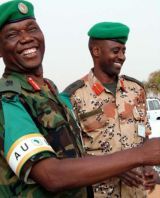Darfur displaced demand AU peacekeepers
By Opheera McDoom
OTASH CAMP, Sudan, April 18 (Reuters) – Survivors of militia attacks in Darfur have accused African Union forces of doing nothing to stop the bloodshed and demanded peacekeepers be sent into the war-torn region.

|
|
African Union Force Commander Major General Festus Okonkwo from Nigeria and Deputy Force Brigadier General John Bosco Kazura from Rwanda laugh in El-Fasher, Darfur, April 15, 2005. (Reuters). |
Hassan Abdel Karim said African Union (AU) troops were just 5 km (3 miles) away when Arab militiamen rampaged through his home village of Thor, killing 22 people.
“They were so close they would’ve heard the shooting but they did nothing,” said Abdel Karim, who told how he fled for his life as gunmen burned and looted homes.
He said the militias, known as Janjaweed, caught the villagers by surprise by attacking early morning. He was sitting at home with his wife and two young children when he heard the shooting.
“I panicked, ran outside — there were horses, camels, shooting, burning and more shooting — it was total chaos,” he said. “My wife grabbed one child, I grabbed the other and we ran into the bush leaving everything we owned behind.
“This attack could have been avoided had they (AU troops) intervened to stop it,” he said, tears welling up in his eyes. “But they just come afterwards and make useless reports.”
More than 2,000 AU troops are deployed in Darfur to monitor a shaky ceasefire between non-Arab rebels and the Arab-dominated central government.
But they are not mandated as peacekeepers and have limited powers to protect civilians in Darfur, a region the size of France in western Sudan.
Tens of thousands have been killed in two years of fighting in Darfur and 2 million have fled their homes. Most now live in miserable makeshift camps.
Abdel Karim and his family are among 27,000 Darfuris who have sought shelter in Otash camp on the fringes of South Darfur’s capital Nyala.
DEMAND FOR PEACEKEEPERS
The village of Thor is in Jabel Marra, a lush mountainous region in the centre of arid Darfur and a rebel stronghold where tensions still run high despite the ceasefire signed a year ago.
Abdel Karim said the presence of AU forces in nearby Nertiti was pointless.
He also said government forces were working with the Janjaweed, although he saw no helicopters or planes in the attack on his village — a previous sign of government involvement.
“I know they were government because they had big machine guns mounted on their vehicles,” he said. “Who but the government has these?”
The Darfur uprising follows years of tribal conflict over scarce resources. The rebels accuse the government of neglect and arming the Janjaweed to attack villages. Khartoum denies this.
The job of the AU force is to report ceasefire violations to a joint rebel and government commission which names and shames those responsible in front of international partners.
But Darfuris at Otash demanded the troops be deployed as peacekeepers.
“These attacks are continuing constantly — all over this region,” tribal leader Adam Abdel Karim Muhajir said.
“(African leaders) need to order them (the troops) to become peacekeepers. Otherwise there’s no point to them being here.”
When the AU mission fully deploys it will number about 3,300, but many of these will be civilian police.
Darfuris at Otash said such a force was woefully inadequate.
“Do they have any idea how big Darfur is? They should come with 300,000 maybe and that may do the job,” Otash resident Moussa Ibrahim Mohamed said.
